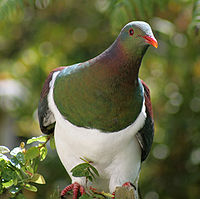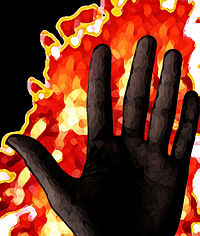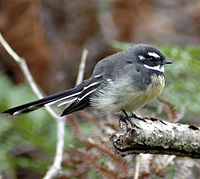- Māui (Māori mythology)
-
 Māui took on the appearance of a pigeon when he went to find his father in the underworld.
Māui took on the appearance of a pigeon when he went to find his father in the underworld.
In Māori mythology, Māui is a culture hero famous for his exploits and his trickery.
Contents
Māui's birth
The offspring of Tū (humankind) increased and multiplied and did not know death until the generation of Māui-tikitiki (Biggs 1966:449). Māui is the son of Taranga, the wife of Makeatutara. He has a miraculous birth—his mother throws her premature infant into the sea wrapped in a tress of hair from her topknot (tikitiki)—hence Māui is known as Māui-tikitiki-a-Taranga. Ocean spirits find and wrap the child in seaweed. Māui's divine ancestor, Tama-nui-ki-te-rangi (or Rangi) then takes the child and nourishes it to adolescence.
Finds his mother and brothers
Māui emerges from the sea and goes to his mother's house, finding there his four brothers, Māui-taha, Māui-roto, Māui-pae, and Māui-waho. Māui's brothers at first are wary of the new-comer but, after he performs several feats such as transforming himself into different kinds of birds, they acknowledge his power and admire him.
At first Taranga does not recognise Māui as her child. At first she denies him, saying, "This is the first time I have seen you. Get out of this house. You are not my child." Reluctantly, Māui moves towards the door, muttering as he goes, "I'll go, then, if you say so. Perhaps I am the child of a stranger, but I did believe that I was born near the ocean, wrapped by you in your girdle, and cast into the sea. And I was rescued by Rangi, and nurtured by him in the sky, where I used to gaze down and watch this house, and listen to your voices. Indeed, I know the names of your children. There is Māui-to-the-side, and Māui-within; there is Māui-opposite, and Māui-without. And I say to you that I am Māui-the-girdle-of-Taranga!" Then, at last, Taranga calls out to him, "You are indeed my last-born, the child of my old age, Māui-the-girdle-of-Taranga" and she kisses him and takes him to sleep in her own bed.
At first the older brothers are jealous and suspicious of the newcomer, saying, “We were conceived in wedlock, and born on the wide-wefted sleeping mat of legitimacy, and we are not asked to sleep with our mother. Yet this abortion, cast into the sea and nursed by seaweed, returns to life and is called to her couch. How are we to know he is really our brother?" After a while though, the brothers accept that the newcomer is one of them (Biggs 1966:449, Tregear 1891:233).
Restrains the sun
Māui takes the jaw-bone of his ancestress Muri-ranga-whenua and uses it as a weapon in his first expedition. This is to snare the Sun and make it go slower because the days were too short for people to get their work done. With the help of his brothers, Māui nooses the Sun and beats him severely with the jaw-bone club until the Sun promises to go slower in future (Tregear 1891:233-234).
Hauls up the North Island
His next exploit is to haul up land from the depth of the ocean—here he again uses the jaw-bone, this time as a fish-hook. Māui, using blood from his nose for bait, hauls the great fish up from the depths. When it emerges from the water Māui goes to find a priest to perform the appropriate ceremonies and prayers, leaving his brothers in charge of the fish. They, however, do not wait for Māui to return but begin to cut up the fish (to grab their share), which immediately begins to writhe in agony, causing it to break up into mountains, cliffs and valleys. If the brothers had listened to Māui the island would have been a level plain and people would have been able to travel with ease on its surface. Thus the North Island of New Zealand is known as Te Ika-a-Māui (The Fish of Māui) (Tregear 1891:234).
His canoe the South Island
In Māori traditions from the South Island of New Zealand, Māui’s canoe became the South Island, with Banks Peninsula marking the place supporting his foot as he pulled up the extremely heavy fish. Therefore, besides Te Wai Pounamu, another Māori name for the South Island is Te Waka a Māui (The canoe of Māui).
Discovers the secret of fire
Māui, finding that fire has been lost on the earth, resolves to find Mahuika the Fire-goddess and learn the secret art of obtaining fire. He visits her but his tricks make her furious and, although he obtains the secret of fire, he barely escapes with his life. He transforms himself into a hawk, but to no avail for Mahuika sets both land and sea on fire. Māui prays to his great ancestors, Tāwhirimātea and Whatiri-matakataka who answer with pouring rain and extinguish the fire. Māui soon after goes out fishing with Irawaru, the husband of Hina, Maui's sister. They disagree when their fishing lines get tangled and, when they return to shore, Māui turns Irawaru into a dog. Hina is distraught and throws herself into the sea, but she does not die. (Tregear 1891:234).
Finds his father
Māui stays with his mother and brothers. Each morning Taranga disappears. Taking the shape of a kererū (wood pigeon) Māui descends after her and finds her with his father, Makeatutara. When Māui’s father is performing the baptismal ceremonies for Māui he makes a mistake in the incantations and this ill omen leads, in the end, to the death of Māui (Tregear 1891:233).
Seeks immortality
Māui now considers himself ready to win immortality for humankind. His father tries to dissuade him, predicting that he will fail because of the mistakes in his baptismal ceremony. His father says to him, “My son, I know that you are a brave fellow and that you have done all things. Yet I am afraid that there is someone who will defeat you.”
“Who could that be?” asks Māui. “Your ancestress Hine-nui-te-pō (Great woman of the nightworld). You can see her flashing there on the horizon.” “Is she as strong as the sun?” asks Māui. “I trapped him and beat him. Is she greater than the sea, which is greater than the land? Yet I have dragged land from it. Now let us see whether we will find life or death.”
His father answers, “You are right, my last-born, and the strength of my old age. Go, find your ancestress who lives at the side of the sky.”
“What does she look like?” asks Māui.
“The red flashing in the western sky comes from her,” says the father. “Her body is like a human being, but her eyes are greenstone, her hair sea-kelp, and her mouth is like a barracouta's mouth” (Biggs 1966:449).
Māui, undaunted, sets out westward, with his companions, to the home of Hine-nui-te-pō. In some versions, his companions are the smallest birds of the forest, the tomtit, the robin, the grey warbler, and the fantail. In other versions, the companions are his brothers. He finds Hine asleep with her legs apart and he and his companions see sharp flints of obsidian and greenstone between her thighs. “Now,” Māui tells his friends, “when I go into the body of this old woman, do not laugh at me. Wait until I come out again from her mouth. Then you may laugh as much as you want.”
“You will be killed!” was all the companions could say.
“If you laugh I will indeed be killed. But if I pass right through her body I will live, and she will die.”
Then he readied himself, winding the cord of his battle club tightly round his wrist and casting aside his garment. As Māui began his task, the cheeks of his watching friends puckered with suppressed laughter. As his head and arms disappear, one of his brothers - or the fantail - can hold back no longer and bursts out laughing. The old lady wakes, opens her eyes, claps her legs together and cuts Māui in two. Now Māui has become the first being to die and, because he has failed in his task, all human beings are mortal. The goddess keeps her position at the portal to the underworld through which all humans must travel (Biggs 1966:449-450, Tregear 1891:234).
Māui and Rohe
In a rare version, a goddess named Rohe is Māui's wife. He mistreats her in a cruel and unusual way. He wishes her to exchange faces with him because she is beautiful and he is ugly. When she objects he gets his way by reciting an incantation over her as she is sleeping. When she awakes and realises what has happened she leaves this world and goes down into the underworld where she becomes a goddess of death (Tregear 1891:421).
Names and epithets
- Māui-tikitiki ("Māui the top-knot")
- Māui-tikitiki-a-Taranga ("Māui the top-knot of Taranga")
- Māui-pōtiki ("Māui the last born”).
See also
- Maui (Hawaiian mythology)
- Maui (Mangarevan mythology)
- Maui (Tahitian mythology)
- Maui (Tongan mythology)
- Ti'iti'i (Samoan mythology)
- Mauisaurus - New Zealand plesiosaur named after Maui.
External links
References
- E.R. Tregear, Maori-Polynesian Comparative Dictionary (Lyon and Blair: Lambton Quay, 1891).
- M. Beckwith, Hawaiian Mythology (University of Hawaii Press: Honolulu, 1970).
Categories:- Māori mythology
- Culture heroes
Wikimedia Foundation. 2010.


